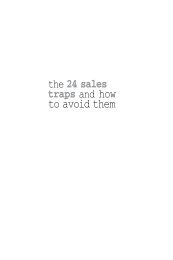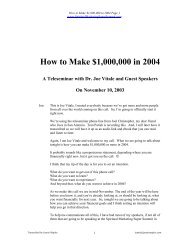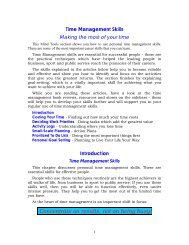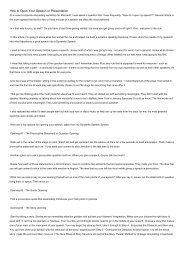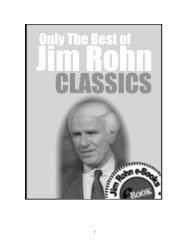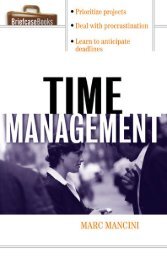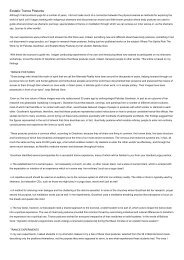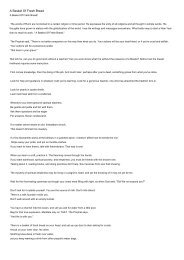Executive Coaching - A Guide For The HR Professional.pdf
Executive Coaching - A Guide For The HR Professional.pdf
Executive Coaching - A Guide For The HR Professional.pdf
Create successful ePaper yourself
Turn your PDF publications into a flip-book with our unique Google optimized e-Paper software.
68 EXECUTIVE COACHING<br />
............................<br />
3. Develop a pool of coaches. Where does an <strong>HR</strong> person go to<br />
find good coaches? <strong>The</strong>re is no national registry. Through<br />
experience and networking with <strong>HR</strong> colleagues, a list can be<br />
built. It is then up to you to create the process to select the<br />
right coach for the needs of your organization. What are the<br />
skills and abilities needed in a coach for your organization?<br />
<strong>For</strong> this client?<br />
As one <strong>HR</strong> professional from a high-tech company puts<br />
it: “<strong>HR</strong> professionals need to make sure that they have someone<br />
who is capable as a coach, who has the interpersonal<br />
skills and recognizes the balance between the individual and<br />
the organization. You can’t use the same coach for all people.<br />
You need a few different coaches in your back pocket.”<br />
4. Be an effective gatekeeper. Develop criteria for determining<br />
when coaching is needed. <strong>Coaching</strong> should not be used in situations<br />
where it is very unlikely to succeed. Non-successes<br />
will happen anyway, but situations that are loaded against the<br />
coach are just a waste of time, money, and reputations. What<br />
are the criteria to determine whether coaching is needed or<br />
not? Requests for coaching may come from anywhere in the<br />
organization. Your first task is to see whether it’s really a<br />
coaching situation (you may wish to refer to the material on<br />
“When <strong>Coaching</strong> Is Appropriate” in Chapter 2). Sometimes<br />
saying “no” will be tough on your relationships with others,<br />
but it has to be done. <strong>The</strong>re also will be times when you<br />
should be the one to initiate a discussion about bringing in a<br />
coach with either the client or with the client’s boss. Sometimes<br />
the gatekeeper needs to open a door that others didn’t<br />
even think was available.<br />
5. Monitor the PR. In the course of your other activities, keep<br />
alert to what’s being said about coaching. Is it seen as a valued,<br />
positive alternative? We all know that some coaching<br />
assignments begin because there’s a “problem” or an “issue”





